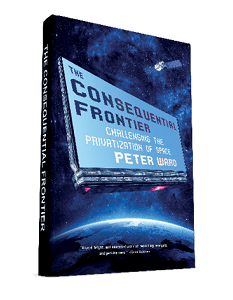The story is a familiar one: space agencies are ‘old hat’ and NewSpace is where it’s at. In common with many of its predecessors, this book looks at the evolution of space towards privatisation, with agencies as customers, and asks how (or whether) this will be regulated and what will be ‘allowed’ within the regulations.
The difference here, perhaps, is the background of the author. Most books on space privatisation, space tourism, space law and the space environment have been written by space professionals keen to highlight the inadequacies of the Outer Space Treaty or the effect of the Kessler Syndrome on low Earth orbit. The author of The Consequential Frontier (one wonders how many more titles can be squeezed from the original Star Trek phrase?) is, by contrast, a journalist, more used to crafting pieces on “robot hospitality, moving sidewalks and special effects in Game of Thrones”. This is good news, because it means (a) that the messages are getting through to professionals outside the space fraternity and (b) that they will be promulgated to a wider audience.
It is reasonably well researched from among the (predominantly American) space community and readers will recognise most of the names. However, despite the promise of an “in-depth work of reportage”, much of it is based on secondary sources spiced up by a few interviews. There is little significant analysis and, despite the subtitle, little real ‘challenge’ of NewSpace entrepreneurs. As a result, space professionals are unlikely to read anything new in this book or discover any ‘take home messages’.
However, they are not the target market. Those who haven’t realised that space is being privatised and risks becoming a ‘lawless frontier’ (there’s another one!) will certainly learn that there are consequences to the exploitation of any environment.











